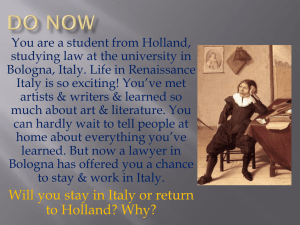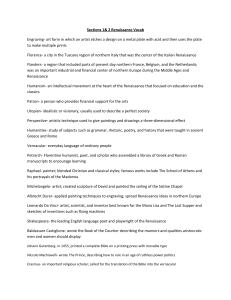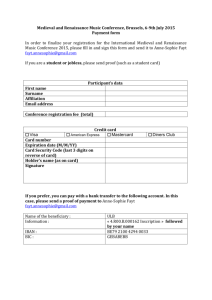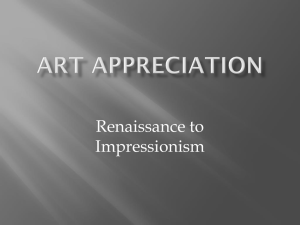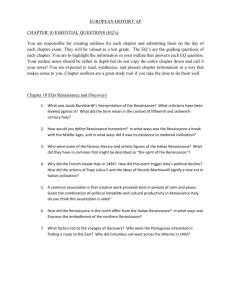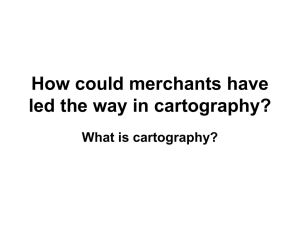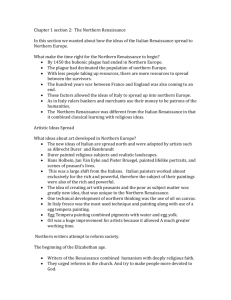Name: Beard – World History Date: ______ Overview
advertisement
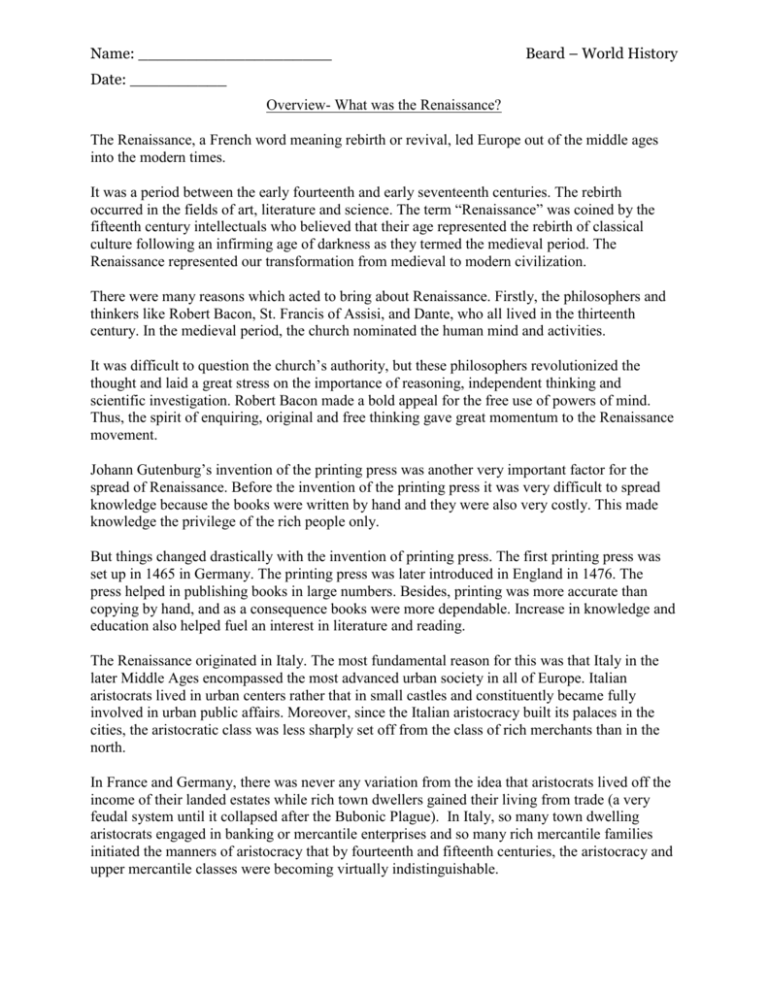
Name: ____________________ Beard – World History Date: __________ Overview- What was the Renaissance? The Renaissance, a French word meaning rebirth or revival, led Europe out of the middle ages into the modern times. It was a period between the early fourteenth and early seventeenth centuries. The rebirth occurred in the fields of art, literature and science. The term “Renaissance” was coined by the fifteenth century intellectuals who believed that their age represented the rebirth of classical culture following an infirming age of darkness as they termed the medieval period. The Renaissance represented our transformation from medieval to modern civilization. There were many reasons which acted to bring about Renaissance. Firstly, the philosophers and thinkers like Robert Bacon, St. Francis of Assisi, and Dante, who all lived in the thirteenth century. In the medieval period, the church nominated the human mind and activities. It was difficult to question the church’s authority, but these philosophers revolutionized the thought and laid a great stress on the importance of reasoning, independent thinking and scientific investigation. Robert Bacon made a bold appeal for the free use of powers of mind. Thus, the spirit of enquiring, original and free thinking gave great momentum to the Renaissance movement. Johann Gutenburg’s invention of the printing press was another very important factor for the spread of Renaissance. Before the invention of the printing press it was very difficult to spread knowledge because the books were written by hand and they were also very costly. This made knowledge the privilege of the rich people only. But things changed drastically with the invention of printing press. The first printing press was set up in 1465 in Germany. The printing press was later introduced in England in 1476. The press helped in publishing books in large numbers. Besides, printing was more accurate than copying by hand, and as a consequence books were more dependable. Increase in knowledge and education also helped fuel an interest in literature and reading. The Renaissance originated in Italy. The most fundamental reason for this was that Italy in the later Middle Ages encompassed the most advanced urban society in all of Europe. Italian aristocrats lived in urban centers rather that in small castles and constituently became fully involved in urban public affairs. Moreover, since the Italian aristocracy built its palaces in the cities, the aristocratic class was less sharply set off from the class of rich merchants than in the north. In France and Germany, there was never any variation from the idea that aristocrats lived off the income of their landed estates while rich town dwellers gained their living from trade (a very feudal system until it collapsed after the Bubonic Plague). In Italy, so many town dwelling aristocrats engaged in banking or mercantile enterprises and so many rich mercantile families initiated the manners of aristocracy that by fourteenth and fifteenth centuries, the aristocracy and upper mercantile classes were becoming virtually indistinguishable. Name: ____________________ Beard – World History Date: __________ The noted Medici family in Florence, for example, emerged as a family of physicians, made its fortune in banking and rose imperceptibly into aristocracy. The result of their development for the history of education is obvious. Not only was there a great demand for education in skills of reading and counting necessary to become a successful merchant, but the richest and most prominent families sought above all to find teachers who would import to their offspring the knowledge and skills necessary to argue well in public arena. Consequently, Italy produced a large number of non-religious educators, many of whom not only taught students but demonstrated their learned attainments in the production of political and ethical essays and works of literature. The schools of their educators, moreover created the best educated upper-class public in all of Europe and incredibly therefore with a considerable number of wealthy patrons who were ready to invest in cultivation of new ideas and new forms of literary and artistic expression. Another reason for Italy becoming the birth place of an artistic Renaissance lay in the fact that it had a far greater sense of rapport with the classical past than any other territory in Western Europe. The Italian aristocratic commitment to an educational curriculum speared success in urban politics. The best teachers understandably sought inspiration from ancient Latin and Greek texts because politics and speech-making were classical rather than medieval arts. Elsewhere, using classical knowledge and classical literacy style may have seemed outdated and artificial, but in Italy, the classical past was appealing. Ancient Roman movements were present throughout the Italian peninsula and ancient Latin literature was popular; Italians recognized their own culture and history. Moreover, Italians became particularly intent on re-appropriating their classical heritage in the 14lh and 15th centuries because Italians then were seeking to establish an independent cultural identity in opposition to a lackluster identity most closely associated with France. Naturally, once Roman literature and learning became particularly favored in Italy, so did the Roman art and architecture. On a separate sheet of paper, answer the following questions. You do not need to rewrite the question. 1. 2. 3. 4. 5. What general areas of culture and society did the Renaissance affect? How did the printing press help the Renaissance spread throughout Europe? What are some reasons why the Renaissance began in Italy? How did the Medici family contribute to the Renaissance? Why did Italy embrace Latin and Ancient Roman ideas?


